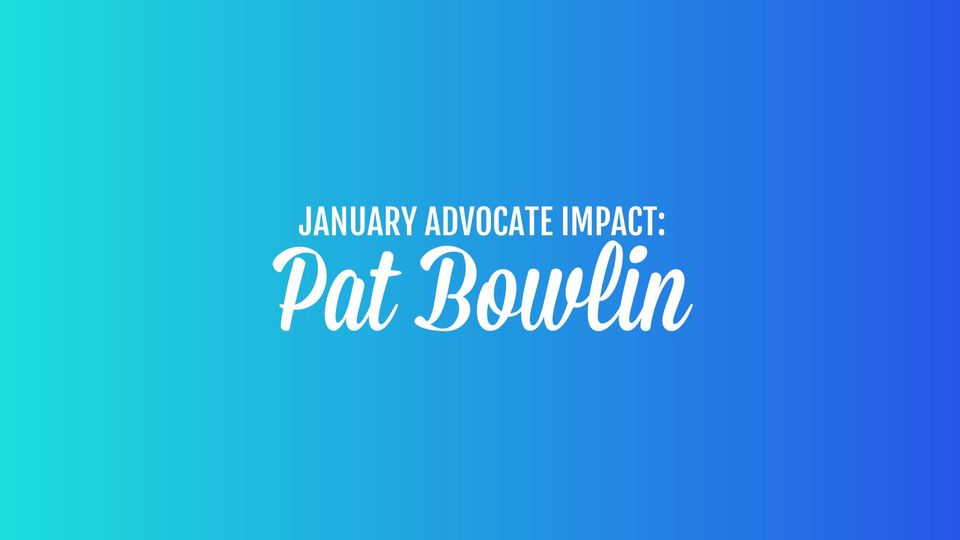Advocate Impact: Pat Bowlin
January CASA Advocate Spotlight
Written By: Pat's Advocate Supervisor

Pat Bowlin has been an Advocate with CASA for almost four years. She graduated from advocate training in May 2015, and eagerly signed onto her first case. Pat saw her first case through permanency while I was not yet her Supervisor, as I began working for this CASA program in Oct. 2016. I had heard from the previous supervisor that Pat was an excellent Advocate, so I called her up and asked if she was ready to take on a new case. Pat had taken some time off and stated she was ready to start speaking on behalf of children again. She chose two cases and is currently advocating for seven children altogether. The case I would like to highlight is a case with four children, two boys and two girls, ranging in ages from 3 to 13. The case started almost two years ago and is still open today!
Once Pat was sure the placements were a good fit for the children and they would be protective of them, even from unsupervised contact with their mother, she advocated for permanent placement with the adult siblings.
The children on this case came into CPS custody as a result of neglect, drug use and mental health concerns for the mother. The family has a long history with CPS and the children’s father is currently incarcerated. The children were first placed with their grandparents but after only a few weeks, the grandparents stated they could no longer care for them. The oldest child on the case was then placed at an RTC where he received trauma-based therapy to address issues of sexual abuse as a perpetrator. After trying to work with mom to get her the help she needed, she continued to test positive for illegal substances and was not addressing her mental illness. Mom was not consistent with visiting the children and this was affecting them negatively. She mentioned she had two older children who are now adults that might be able to take the children. After contacting them, they decided they would like to care for their younger siblings long-term. The girls were placed with one of the older siblings and the boys with the other. Pat visited often, providing guidance while ensuring the children were in a safe and loving environment. She checked in with mom occasionally to see how she was progressing as well. Ultimately, mom became pregnant again, and agreed that the best place for the children would be with their siblings. Once Pat was sure the placements were a good fit for the children and they would be protective of them, even from unsupervised contact with their mother, she advocated for permanent placement with the adult siblings. She was in agreement with all parties to have the older siblings become licensed to foster, so they could receive financial assistance and better provide for the children.
While it has taken one of the caretakers longer to become licensed due to personal issues, Pat constantly encourages her to not give up. Pat’s kind and loving nature has allowed her to establish a bond with the family. They know she genuinely cares and is concerned for their safety and well-being. Pat has been a strong support to this family; making life-changing impacts on this case. She takes the children on outings and assists at times with sibling visits, ensuring the children maintain a family connection.
Not only does Pat communicate with the children’s teachers, therapists, and the caseworker to ensure she is made aware of any issues or concerns, she also celebrates the progress the children make. Pat is continually looking for resources in the community to help the families out. Furthermore, anytime she has a question or concern, Pat will call me or the caseworker to try to resolve an issue or find the best solution to the situation. She is not afraid to speak up in court on the children’s behalf and has strongly voiced her opinion to all parties on the case over what she believes to be in the children’s best interest. In addition, Pat supports CASA’s vision and mission, inviting and recruiting friends and others in her community to learn more about CASA so they too can step up and speak on behalf of abused and neglected children.
Pat has been a strong support to this family; making life-changing impacts on this case. She takes the children on outings and assists at times with sibling visits, ensuring the children maintain a family connection.
Although the children in this case are not being reunited with their mother, they have achieved permanency with their adult siblings. It was decided through a court mediation that the adult siblings will have permanent custody of the children. Their mother was able to maintain possessory rights to her children and will be able to have contact with them under their caretaker’s supervision and protection. Pat has been a great blessing not only to this family, but to all the families she has advocated for. She has the perfect balance of compassion and courage. She is a mama bear when it comes to her CASA children. I am grateful for all she has done, not only for the children, but for me as her supervisor. Pat always keeps me informed of her cases, exceeds CASA’s minimum expectations as an Advocate, and attends trainings, meetings and cultivations regularly. Pat is a true example of an exemplary Advocate!

In November 2025, Child Protective Services received a referral involving two sisters, ages 13 and 14, who were found caring for themselves. Following the death of their father, the girls experienced ongoing abuse and neglect. They were living in unsafe and unsanitary conditions, frequently left alone without adequate food, functioning plumbing, or consistent supervision, and were exposed to strangers regularly coming in and out of the home. Shortly after removal, Tameka Woolfolk was appointed as the Advocate on the case. From the very beginning, Tameka became one of the few consistent and reliable adults in the girls’ lives. The children experienced and continue to endure placement changes. These frequent transitions created ongoing instability and further complicated the girls’ ability to heal and adjust. Throughout each move, Tameka remained steadily involved, working diligently to ensure that the children’s services and support continued without interruption. She supports the girls not only emotionally, but physically as well helping pack their belongings at each move, accompanying them during school tours, and remaining readily available whenever they need support. Neither child was initially aware that they had the right to speak directly with the judge. Tameka recognized the importance of their voices being heard and with the support of the Ad Litem, helped to facilitate their presence at court, requesting that the judge meet with the girls in a breakout room, so they could personally express their wishes, all with the department, CASA and the Ad Litem by their side. In addition, this case was referred to Collaborative Family Engagement (CFE). During CASA’s ongoing exploration for family connections alongside the Department, Tameka discovered the children’s father’s obituary. Through this discovery, it was learned that the girls’ father had served in the United States Army as a combat medic during the Vietnam War and later worked for 30 years in civil service. Tameka took the initiative to request documentation, including VA records and a death certificate, to determine whether the children might be eligible for survivor benefits. The obituary also revealed that the girls are two of fourteen siblings. While many of the siblings were unable to provide support, CASA and the Department were able to establish contact with one brother. Through Tameka’s strong collaborative relationship with the Department and the Attorney Ad Litem, a thoughtful and appropriate plan was developed to allow the girls to begin visits with their brother, his wife, and their cousins. Although this story is still unfolding, both girls know one unwavering belief, that no matter what comes next, they know that Miss Tameka will continue to stand beside them every step of the way.








